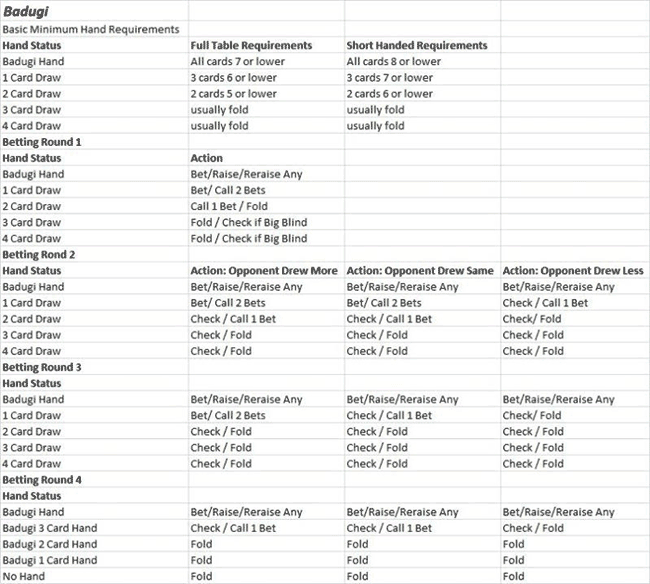Badugi is a game that has gained wide popularity especially on Merge sites like Lock Poker. They even have daily freerolls for it.
Badugi is not complicated to play, but it can be confusing to a new player just learning it. The rules are clear and easy to understand.
To begin with, Badugi is a 4-card, triple-draw lowball poker. Betting depends on the whether Badugi is played as a limit or pot limit. I am not sure if there is any no-limit Badugi games online. In a limit game, players can only raise the bet based on a specified or incremental unit per round. A pot limit game allows players to bet any amount from the minimum, equal to the big blind, to the maximum equal to the current pot value.
During the betting round, the players may choose to call the bet, check, raise or fold the card and leave. A player’s betting decision depends on the kind of card combination or hand.
Badugi players have three card drawing rounds. In each round, you may maintain the existing hand or replace from one to four cards. The aim of each player is to have the lowest badugi. A badugi is a 4-card hand where there are no cards with the same value or from the same suit. You want to get a hand with all low numbers (below 8 is preferable) and with no pairs and no two cards of the same suit.

The first section describes what should be selected as starting hands in different situations. So, if you have a made Badugi hand, all cards should be seven or lower for a full table or eight and lower for a shorthanded table. If on the other hand you have a one-card draw to a Badugi, all qualifying cards should be six or less for a full table and seven or less for a shorthanded table, and so on. Obviously, with the exception of special circumstances (such as the blinds) you should not be playing three or four card draws.
The rest of the data takes you through each round, comparing what you are drawing to, with what your opponents are doing. For example, it is generally a mistake to draw if an opponent has not (unless you are sure they are bluffing). Conversely, if your opponent draws more cards than you then you should perhaps bet, to drive them out of the pot and for value when you do make your hand on a later draw.
As a final note, because you will be drawing to a 7-low most of the time by following these guidelines, when you do make a hand you will generally be playing the best hand on the table. There are also times when you make a higher Badugi Poker hand (such as a 9-low) which can still win you the hand providing your opponents are still drawing (not so strong if another player is already standing pat).

